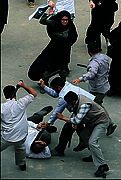Infiltrators Killed, We Did Not!
» IRGC Commanders’ Contradictory Reports on Killings
Until now commanders of Iran’s Revolutionary Guards (IRGC) have been giving dissimilar explanations of the role of para-military Basij forces in the post-election crackdown in the country. But two days ago Hossein Hamedani, the recently appointed commander of Tehran’s Mohammad Rasool-Allah brigade spoke of a role that infiltrators in the Basij played in the shooting incidents and announced that “twelve” individuals had been arrested in this regard.
Speaking to Mehr news agency, Hamedani said, “Twelve individuals who represented themselves as Basij members have been arrested and they have been presented to the judiciary for their follow up.”
The commander of this brigade spoke about the shooting of people by the Basij inside a Basij base and said, “Investigations have shown that these individuals were infiltrators and not real Basij personnel, nor even supporters of any presidential candidate, and their cases are being investigated by the revolutionary court.”
“These days should a person engage in a violation inside the Basij and should his commander fail to control him, then the commander and the perpetrator will be both held accountable,” he said.
These remarks come despite the statements that the previous commander of the same IRGC brigade, Abdollah Araghi, had made last month to Kayhan newspaper regarding the direct shooting of people to the effect that he had been giving “orders to the Basij center 117 on Azadi street.”
Araghi had also told Kayhan, “I passed my orders to the commander of the Basij center through telephone messages. There, our forces first used 300 tracer bullets but despite the calls of the Basij commander at the center that the center was a military base, protesters continued their attacks towards the arms depot as a result of which two individuals were killed.”
In his description of events, Araghi had said that, “One of the saboteurs had climbed the communications tower in order to attack the arms depot. According to military rules, any person who attacks a military base to capture it or take possession of arms in it must be shot at.”
In his version of events, this commander had not mentioned the existence of any “infiltrators” in the Basij force who had a role in shooting at people but had confirmed that those shootings had taken place by the Basij and that they were done on his command.
At the time, Araghi had claimed that people had been killed by “saboteurs,” the term that he used for people who were protesting the announced election results.
Leader Praises the Basij for Its Crackdown
These comments by senior IRGC commanders to deflect responsibility for the deaths of people who were protesting election results come when the role of the IRGC and the Basij in the violence has been repeatedly confirmed by their superiors, just as Mohammad Ali Jaafari said on Saturday, “The Basij’s participation and standing behind the supreme leader resulted in the neutralization of these recent plots and conspiracies. If there had been no Basij, we don’t know what condition we would be in right now and the conspirators may have succeeded in their goals.”
Prior to these remarks, general Jaafari had said that ayatollah Khamenei had thanked the role of the IRGC and the Basij in cracking down public protests. In addition, the supreme leader of Iran had issued an order and replaced Hassan Taeb as the commander of the Basij force and transferred him to be the deputy intelligence of the IRGC, while thanking him for the role that the forces under his command had played in violently confronting the public.
On June 19th, in his first response to public protests regarding the officially announced results of the June 12 presidential elections, ayatollah Khamenei threatened the protesting candidates by holding them accountable for the upcoming bloodshed. This was just a day before the bloodiest crackdown took place.
Soon after the crackdown and violent suppression began, Alireza Hosseini Beheshti, the representative of presidential hopeful Mir-Hossein Mousavi in the special committee set up to investigate the victims of the post-election turmoil announced that he had presented to the Majlis a list of 69 post-election protestors who had been killed. He also pointed out that many family members whose relatives had been killed, had disappeared or been hurt in the post election turmoil did not pursue the matter for fear of reprisals.


